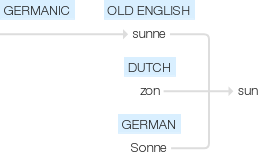Sun
Old English sunne, of Germanic origin; related to Dutch zon and German Sonne, from an Indo-European root shared by Greek hēlios and Latin sol .
wiktionary
From Middle English sonne, sunne, from Old English sunne, from Proto-West Germanic *sunnā, from Proto-Germanic *sunnǭ, from heteroclitic inanimateProto-Indo-European*sh₂wen-, oblique of *sóh₂wl̥(“sun”)
See also Saterland Frisian Sunne, West Frisian sinne, German Low German Sünn, Dutch zon, German Sonne, Icelandic sunna; outside of Germanic, Welsh huan, Sanskrit स्वर्(svar), Avestan 𐬓𐬇𐬧𐬔 (xᵛə̄ṇg)).
Related to sol, Sol, Surya, and Helios. More at solar.
From Japanese 寸(sun). Doublet of cun.
sun ( uncountable)
etymonline
sun (n.)
Old English sunne "the sun," from Proto-Germanic *sunno (source also of Old Norse, Old Saxon, Old High German sunna, Middle Dutch sonne, Dutch zon, German Sonne, Gothic sunno "the sun"), from PIE *s(u)wen-, alternative form of root *sawel- "the sun."
Old English sunne was feminine (as generally in Germanic), and the fem. pronoun was used in English until 16c.; since then masc. has prevailed. The empire on which the sun never sets (1630) originally was the Spanish, later the British. To have one's place in the sun (1680s) is from Pascal's "Pensées"; the German imperial foreign policy sense (1897) is from a speech by von Bülow.
sun (v.)
1510s, "to set something in the sun," from sun (n.). Intransitive meaning "expose oneself to the sun" is recorded from c. 1600. Sun-bathing is attested from c. 1600.
